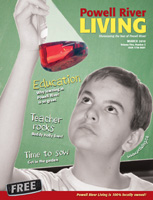March 2010
>> This entire issue is available as a 20MB PDF download
Table of Contents
In the belly of the beast
Learning for life
Not your average teacher
Coming up!
With the leprechauns
Pardon My Pen
Citizens on Patrol
Time to plant
How the past influences the future
ESL and phonemic awareness
Family Matters
When games can make a difference
For Art's Sake
Business Connections
Toastmasters changes lives
All about HST
How the mighty have, and do fall
Seedy Saturday grows up
Keeping the high country open
Explore Powell River
In the belly of the beast
A life-changing experience
By Bonnie Krakalovich
A couple of weeks ago I was swallowed by a whale. An ORCA, to be exact. What a life changing experience. It wasn't the kind of life changing experience that Jonah had, but nonetheless it made a huge impact on me.
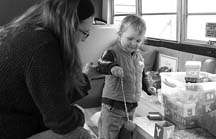 First I entered the front of the ORCA with the driver, another volunteer and the facilitator for the day. We sat on fairly comfortable seats and were then transported to Lund where the whale commenced swallowing smaller humans with their parents. In all, I think we had an about seven little humans between 0 and 6 years old and about the same amount of adults including us, the first batch to be swallowed.
First I entered the front of the ORCA with the driver, another volunteer and the facilitator for the day. We sat on fairly comfortable seats and were then transported to Lund where the whale commenced swallowing smaller humans with their parents. In all, I think we had an about seven little humans between 0 and 6 years old and about the same amount of adults including us, the first batch to be swallowed.
Then the fun began. I tell you this is no ordinary whale. This ORCA loves to have fun. We played with building blocks, we read books, we coloured. At one point one of the three- or four- year-old girls put on a mouse costume and scared me so badly I almost jumped out of my skin. (Not really, but I had her thinking that I thought she was a real mouse.) Finally she took the hood of the costume off her little head and squealed "It's just me!" I said, "Oh, thank goodness, I thought we were going to have to put out a big mouse cage to try and catch you." She just giggled and ran to put on the magic unicorn costume with wings, so she could fly around the belly of the whale. Oh, to be that young again and have that imagination.
I was then privileged to hold an eight-month-old youngster. He was precious. He definitely was not afraid of being in the belly of the whale, as he looked around and chattered away about all the wonderful things that he could see out of the windows. (Yes, this whale has windows) Then it was snack time and my fickle young man went back to his mom. Oh Boy! These little ones love their snacks. And they all know they have to stand in line to wash their hands before eating, use their manners and say please and thank you. The snacks were very healthy, consisting of mostly fruits and veggies.
After snack time was done, the facilitator put on the music and everyone grabbed an instrument and we were treated to an impromptu jam session/dance lesson. The energy in the ORCA was incredible. I decided to go back and sit beside my young man's mom. As soon as I sat down, this little miracle immediately held his arms out to me and my heart just melted. For the rest of the day I was on cloud nine and I don't think anything could have put me in a bad mood.
So if you find that you are a grandparent like me, with your grandchildren living somewhere else, here is my suggestion to you: Volunteer with the ORCA (On the Road with Children's Activities) bus. It is the most amazing experience you will ever have and they are always on the lookout for more volunteers. The children are fantastic and there is no way you could be in a bad mood after spending a couple of hours with them.
So that is the story of the day I was swallowed by a whale. It is a day that forever changed my life. We can learn a lot by spending time with these amazing little humans and I am so grateful to have the opportunity to engage with these youngsters, who are the future of our world, and experience the world through their eyes, if only for a few hours a week.
If you can help, contact Volunteer Powell River at 604 485-2132 or volunteerpr@shaw.ca.
When I was little, I was going to be a scientist. Because I loved the ocean and sea creatures so much, I was sure I was destined to be a marine biologist.
I still love marine biology, as regular readers may have noticed my affinity for underwater photographs and stories about lingcod and sea urchins. But along my educational path, I was introduced to something that suited me even better. It started in Grade 4. My Grade 3 teacher was the dynamic Shirley Koleszar, who fed my love for natural science, which was clearly also one of her passions. So I headed into Grade 4 with confidence that I was bound for a career as a scientist. Then I went into Mrs. Halliday's class. At first I hated her. She was strict and she kept pushing me to focus on language arts. It wasn't until the year was almost over that my pre-pubescent brain figured out that I was not only good at it, but that I liked writing. And that Mrs. Halliday was a great teacher.
Fast forward five years to Mr. McCune's English class. I sat stunned, looking at a test I had had returned with a failing grade. A fail! I was an A student. I had never failed a test. How could I fail an English test--my best subject? I couldn't even hate Mr. McCune because he was witty and sharp--one of my favourite teachers. Truth was, I had read the novel for the test, Shane, as if it were just a a dime-store Western, hadn't studied, and had given lame answers on the test. The lesson was clear--I had to work and could not rest on my laurels.
Two years later, I was introduced to Mr. Wright, a small, frail-looking man with a mind that continually challenged a bright group of advanced placement English students. He honed our skills and taught us to love the language.
These fine educators, and others, helped shape me, and I will always be thankful for their steering me down a path that led to a career in journalism and publishing.
That story is repeated, in various forms, throughout our community. Many of today's community leaders can point back to teachers, classes and schools that changed their lives and put them on the right track.
Powell River schools have a long history of excellence. From pool-rooms and bunk houses to the new Brooks, Powell River has been known as a "light-house" district. As you'll read in the Blast from the Past starting on Page 16, the school here established a technical course as early as 1930 to train students to work in the mill. Today, the trades courses at Brooks and VIU continue to prepare students for quality employment.
Powell River's schools have also long been known for their music and performance programs, and this issue shares some images from the Festival of Performing Arts. We also had more to celebrate last month with the Olympic torch visiting Powell River, and this issue shares some images from that visit, too.
There's always much to celebrate in Powell River, and the fact that our planting season starts so early is another reason to love living here. On Page 15, you'll find our "Time to Plant" feature and on Page 40 a look ahead at the Seedy Saturday event. Another thing Powell Riverites celebrate is the amazing backcountry, and on Page 42 you can read about a campaign to keep access open to the glorious heights of Skwim Mountain, Triple Peaks and the Powell Divide.
And in case you think you're too old to learn, we introduce you this month to some Seniors Games swimmers who took up the sport late in life. I had the privilege of photographing these amazing women for our story on Page 31. They were great sports, and not afraid to try something outside the ordinary, as you'll see from the image. Enjoy!
Sean Percy, Associate Publisher ¥ sean@prliving.ca
Not your average teacher
Buddy Holly rocks on with Jim Baron
By Isabelle Southcott
By day, you'll find him moving about the classrooms at Assumption School as he divides his time between the Grade 3, Grade 7 and 8 classrooms. At first, Jim Baron seems like your average teacher; good with kids, committed, and interested. All the characteristics you hope to find in a teacher.
But dress him in a pair of horn-rimmed glasses, a royal blue blazer, a white shirt and a tie and stick an electric guitar in his hands, and watch out! Jim Baron the teacher evaporates and Buddy Holly takes his place.
Since moving here three years ago, Jim Baron has built a bit of a reputation as Buddy Holly. The real rock and roll superstar died in an airplane crash 1959 but his songs live on. Rave On, Peggy Sue, That'll Be the Day and Oh Boy! are just some of the Buddy Holly songs that Jim (also known as Mr. Baron) does.
Becoming Buddy Holly is quite an interesting story, almost as interesting as some of his other stories.
Jim moved to Powell River three years ago in a roundabout way. Jim and his wife, Fiona, lived in Richmond, Vancouver, Langley and Cloverdale before finding Powell River.
"Part of the reason I came to Powell River was because there was an opening here. Assumption was looking for a music specialist and someone who could teach band. They were having a hard time finding someone to move to Powell River from Vancouver. People we talked to thought it was an island. I'd been here once before in 1990 and put on a show with The Legends of Rock and Roll at the Beach Gardens."
While performing, Jim met a chef called Dave. "Dave Bowes treated the band to an amazing seafood bouillabaisse. We all remembered that bouillabaisse because it was so good!"
Sixteen years later, Jim moved to Powell River. "Shortly after moving here, the teaching staff at Assumption School had a retreat at Desolation Resort and then went for dinner at the Laughing Oyster. I looked at the menu and saw Dave's Bouillabaisse. I ordered it and it was as good as I remembered it had been."
Dave wasn't there that night so Jim talked to Scotty who told him about the Beggar's Banquet. "Scotty told Dave and Dave remembered me and invited "Buddy" to come play in full costume!"
Jim remembers his first Beggar's Banquet at the Laughing Oyster well. "The second set just took off. There were people dancing all over the place. I don't think people were used to dancing in such a small restaurant. "
To say Jim Baron's Buddy Holly act has been successful is an understatement. Even his students think Mr. Baron is cool!
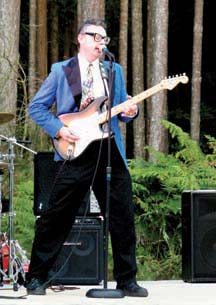 "A lot of the songs I teach for sing-alongs are taken from 1950s music. The kids are singing a lot of nostalgic music as part of their learning. I don't teach a very traditional band program; I try to find music that kids can latch on to and connect with."
"A lot of the songs I teach for sing-alongs are taken from 1950s music. The kids are singing a lot of nostalgic music as part of their learning. I don't teach a very traditional band program; I try to find music that kids can latch on to and connect with."
Music has been an important part of Baron's life for many years. When he lived in Surrey, in 2005, he had a three-piece band. "We had a lot of work at Fogg'N Suds (a Vancouver bar-restaurant chain). One night a lady came up and said: 'Michael Bublé would like to sing with you.'" "I'd never heard of Michael Bublé before. Apparently he used to be a dishwasher at Fogg'N Suds and this was a staff party and he was invited. I basically said we don't let people use our microphones but she could tell him to come over to our table at our break and we'd see if we would let him sing."
Michael came over and told them he was about to leave but then he began having such a good time so he stayed. He wanted to know if he could do a few Elvis songs.
Jim said "sure" and Michael began to sing.
"All these girls were screaming and dancing. I thought, 'I guess they all know him.'"
After Michael finished he asked Jim if his band had an agent. "I told him, 'No we don't need one, that's fine.'"
Not long after, Jim was watching the Super Bowl and an announcement came on about a surprise Canadian artist singing the national anthem. It was Michael Bublé. "We said, 'Oh, wow, I guess he was famous!'"
To this day Jim kicks himself. "I never got a picture or an autograph but he did enjoy our music!"
And enjoying music is what it is all about. Be it teaching, learning, or performing, music is a big part of who Jim Baron is. Jim Baron the teacher. Jim Baron the performer. Jim Baron the family man.
Rock on!
Vocal Summit 2010
The 16th annual vocal summit is coming up April 23 and 24 at the Evergreen Theatre.
"We feature concert choirs and chamber choirs as well as jazz choirs," said Peter Taylor, a member of West Coast Jazz and Blues Society, event organizers.
So far, 17 choirs have confirmed attendance.
On Friday night, April 23, there will be a concert featuring the Chamber Choirs from the summit festival. On Saturday, the choirs will perform for adjudication; the evening concert will feature Brooks Jazz Choir along with some choirs selected by adjudicators.
The guest artists for that concert are the Seattle Jazz Singers. "They are a six-singer vocal group with a full rhythm section, horns and brass section. They're conducted by Frank Demiero, one of our adjudicators," said Taylor.
Tickets will be available at Benjamin Moore Paints in mid-March.
"It's a pretty big event, we do it every year, and it will be a great event," said Taylor.
Peace poem contest
Organizers of the annual Youth Peace Poem Competition are looking for entries for the 2010 contest. Deadline for submissions is March 13. There is no fee. Students may enter as many poems as they like.
Students not in a participating class can enter individually by mail to:
- 6799 Cranberry StreetPowell River, BC V8A 3Z3
- or by email to:kaimana.wolff@yahoo.com
- or call Eva van Loonat 604 483-4940.
This year, organizers have recruited one of BC's brightest musical stars to work and perform with those who enter the contest. Well-known singer/songwriter Valdy will head up a workshop and help students turn their lines into songs.
An awards ceremony and performance rounds out the event at Max Cameron Theatre on April 8.
Shut off the lights...
...and go skating, or swimming! BC Hydro is sponsoring free swim & skate at the Recreation Complex on March 27 in conjunction with Earth Hour. "The goal is to have the families turn off all their lights and unused electrical equipment at home for an hour and come to the complex for a free night of swimming or skating," said organizer Jennifer Mercer. Skating and swimming will be free 7 - 8:30 pm.
Townsite celebration planned
Did you live in the Townsite or do you know a former Townsite resident who has moved away? Yes? Then the Townsite Centennial Celebration Committee wants to hear from you as they prepare to celebrate 100 years of the Townsite.
The committee is busy planning a fabulous Centennial Celebration for the BC Day long weekend, July 30 Ð August 2 and they're looking for past and present Townsite residents.
"The Townsite was Powell River until 1955," said Ann Nelson, owner of the historic Patricia Theatre and member of the organizing committee. "Prior to that, it was the hub of the universe for commerce, residential and governance."
Centennial weekend events include the unveiling of Henderson House, a parade, sports day and picnic, a dinner and dance, heritage house tours, golf and lawn bowling and tea and fashion show.
For more information visit:www.powellrivertownsite.com or call 604 483-3901.
Career Fair
Do what you love; love what you do.
Find something you love to do and then, when you find that, become proficient at it.
So says Jim Jordan, motivational speaker, author and entertainer.
Jordan is the keynote speaker at this year's Career & Education Fair at Brooks Secondary School. "It doesn't matter if you are a teacher, a lawyer or a clown. What matters that you do what you love and when you do that, you will be come habitually proficient," he says.
Jordan will speak to parents and students at 7 pm on March 24 in the Max Cameron Theatre and to students on March 25 and 26.
The three-day fair is for all students in Grades 8 to 12. It is to help students explore as many careers, colleges and universities as possible.
Jordan's presentation "Never work a day in your life" draws on his own background as 20 years as a professional children's entertainer. "When you love what you do you become habitually proficient."
Jordan talks about transferable skills and how what students learn at school can be used in their jobs. Today Jordan works as a motivational speaker and uses many of the same skills he used as an entertainer. "I talk about how I've applied these skills to my life so I wake up on the morning to do what I love to do."
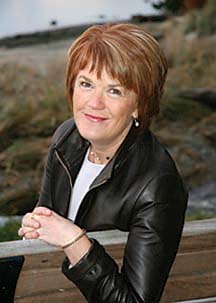 With the leprechauns
With the leprechauns
St Patrick's Day book launch
Did you ever have one of those trips where everything that could go wrong, did?
When local author Tanis Helliwell's 13th tour of Ireland went awry, she learned more about life and people than she would have on the perfect getaway.
During a journey to the sacred sites of Ireland, Helliwell and fellow travelers from North America and Europe discovered it was far better to roll with the punches than fight the inevitable.
"We found a tour agent in Ireland has changed half the hotels and half the sites we planned to visit and it went downhill from there," said Helliwell.
A St. Patrick's Day book launch of Helliwell's book,
Pilgrimage with the Leprechauns,
a true story of 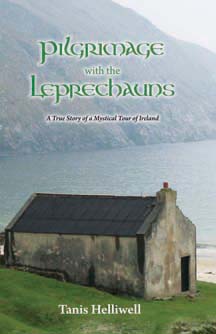 a tour of Ireland, will take place on March 17 at Breakwater Books from 4 to 6 pm.
a tour of Ireland, will take place on March 17 at Breakwater Books from 4 to 6 pm.
"You learn more during times of difficulty than good times," said Helliwell. "It turned into a pilgrimage of not having your own way and accepting what happens. It was good learning experience."
This book is about being able to laugh at yourself. It was what the Irish call "the craie."
Helliwell is a psychologist and one of the courses she will be teaching this year is about "How We Are Changing As Human Beings."
Other books to Helliwell's credit include Summer with the Leprechauns, Embraced by Love and Take Your Soul to Work.
Pardon My Pen
By George Campbell
Revisiting some 'old sayings'
One of the first 'old sayings' I remember hearing is when I was five years old and my Dad was trying to teach me how to walk on stilts. After I'd fallen off the things for the fifth time and was ready to give up in disgust, my Dad said, "If at first you don't succeed, try, try, try again." I did try again, and I did succeed in walking on stilts. I sometimes wonder if the outcome would have been the same if my father had quoted the modern version of this oldie. To wit: "If at first you don't succeed, skydiving is not for you."
Many old sayings have been modernized to reflect the stresses and strains of the present day world. "A rolling stone gathers no moss," has been changed to, "a closed mouth gathers no food." "Give a man a fish and he'll eat for a day; teach him to fish and he'll eat for a lifetime," has been updated to: "Give a man a fish and he'll eat for a day; teach him to fish and he'll sit in a boat and drink beer all day."
Not all sayings are rehashes of those that have been around forever. Some are completely new. "Generally speaking, you aren't learning much when your lips are moving," is one of these. "There are two theories to arguing with women. Neither one works," is another. Whether they have the lasting power to become really old sayings only time will tell.
Speaking of arguing with women, I am particularly fond of the modern day saying, "Never argue with your wife, because even if you win, you lose." I have had considerable experience with this quotation and can attest to its profound truth.
A master of memorable phrases, the ancient Chinese philosopher Confucius once said, "Never kick a dog with both feet at the same time." Confucius also said, "Puppy love, if persisted in, may lead to a dog's life." He didn't like dogs. This was because of an incident that took place when he was a young man. A lady with a small dog on a leash was standing beside him on the street. They were waiting for some rickshaws to pass so they could cross to the other side. Suddenly Confucius jumped away from the dog and drew back his foot. The lady pulled quickly on the leash and snapped at Confucius, "He won't bite, he was just sniffing your ankle." Confucius bowed his head politely to the lady and said, "My dear woman, I was not worried that your dog would bite me, but he lifted his leg and I thought perhaps he was going to kick me."
Mark Twain stated, "Truth is such a precious commodity we should all economize in its use." It often seems that politicians have this old saying in mind when they stand up to speak, especially at election time. Perhaps this is what prompted some modern day quipster to declare, "They say politics is a craft, and they may be right. Most of the politicians I have known have been pretty crafty."
Rather than keeping Mark Twain's quotation in mind, those seeking to get elected might be better off remembering this piece of advice: "He who talks with tongue in cheek should avoid making biting remarks."
I started this little essay with an old saying my Dad quoted in an attempt to motivate me. It seems only fitting to close with a favourite saying of my Mother's. "Always remember," she would say with solemnity, "that you are unique." Then she'd add the kicker, "Just like everyone else."
She's right. I am, and so are you.
Eyes and ears for the police
When rising crime rates threatened the safety of their homes, local citizens got together and formed the forerunner of today's Citizens on Patrol (COP).
Elvio Cramaro and Heather Sketchley joined Citizens on Patrol soon after it was first formed in early 2000. "At that time there were problems in Cranberry so people in Cranberry started their own group. They were annoyed with the drugs and the break-ins," said Sketchley.
Citizens on Patrol is an organized program that comes under the umbrella of BC Crime Prevention.
Clara Whitmore, one of the original organizers of COP, has now stepped back but Cramaro recalls early meetings in Clara's rec room.
"At one point we had well over 100 members and a lot of people were actively patrolling," he said.
Today, numbers have dropped to about 50 members. "We need more volunteers," said Cramaro.
Some members patrol regularly, others are gone for part of the year, and others are on a spare list.
"We try to fit in where the police find it more valuable to have us," said Sketchley.
"We are eyes and ears for the police. We do not arrest or confront anyone. There is a definite structure when you go out to patrol," said Sketchley.
COP works out of the community policing office in the Town Centre Mall. This space has been kindly donated by the mall.
Scott Palm, COP president, has been involved with the organization since its early days. "We lived south of town and one night, my 90-year-old neighbour got broken into. He chased them out but he was confronted by the intruder and that was enough for me."
People who volunteer their time for organizations such as COP are part of the solution.
"A lot of people got involved because they knew or knew of someone who had been broken into or vandalized," said Palm. "Instead of feeling helpless, they got involved."
Before COP was formed in 2003, there were 1,350 break and enters and 1,942 incidents of vandalism/property damage. Statistics for 2009 show 92 break and enters and 388 incidents of vandalism and property damage.
"As you can see, these numbers show how much of a significant difference Citizens on Patrol has made in Powell River, said RCMP Constable Kerri Chard. Our community owes Citizens on Patrol a debt of gratitude for their ongoing contributions in working towards a safer community."
COP also operates the speed-reader board and Lock Out Crime, programs which are run by ICBC through the RCMP in Powell River.
If you are interested in volunteering or learning more about COP, drop by the mall office and fill out a form.
Time to plant
By Jonathan van Wiltenburg
With the unseasonably warm weather and an upcoming Seedy Saturday event, I thought it would be relevant to discuss the ins and outs of starting plants from seed. According to the late homesteading hero John Seymour, starting seeds does not require a green thumb, it requires is a bit of "common sense and a sympathy for new life."
It must be clarified that there is nothing immoral with buying your plant starts. The local nurseries certainly appreciate it, and if you don't have the right set-up for growing from seed, it can be a fairly "fruitless" pursuit. You can't do everything. Make sure you know your time commitments and plan to succeed.
The first thing to consider is what you are planting. Some crops prefer to be sown directly in the soil. Most can be started in a pot, then transplanted to the garden. To get started you will need a growing medium. For the unseasoned gardener I recommend buying a commercial potting mix. This is usually a mix of peat moss and perlite, and it provides the ideal water holding capacity and friability for a seed to germinate and grow. Sow your seeds in the soil by following the instructions on the seed packet for depth and timing. To avoid drying out the seeds between waterings, cover them with a thin layer of horticultural-grade vermiculite or fine-grain potting mix.
Once the seed has been planted, success depends on warmth, moisture and light. Warmth can be provided by the ambient temperature of your home. An alternative is to use a heat mat or heater cable, which can be found at your local garden supply store. This works nicely in a greenhouse setting and is excellent for species that require a warmer consistent growing environment.
Light is also straightforward. If you don't have a greenhouse setup, a south facing window with plenty of light will be adequate.
Lastly, you need to water your seedlings. A fine mist is best (I use an old cleaned pesticide sprayer). Water twice daily, keeping the soil quite wet. Once germination is noticed and the leaves have appeared, water less often, usually once every two or three days.
If the roots seem to be getting crowded, pot your seedlings on to a larger pot or put them outside for a few days, then place in the garden.
If the deep green leaf colour begins to fade consider giving a shot of organic fertilizer. For tomatoes and other frost tender plants, wait to plant them outdoors until the danger of frost has passed.
What you'll need to start:
- Seed and growing media
- Growing container (flat or pots)
- Mist watering option
- Horticultural grade vermiculite (optional)
Top Priorities for March
- Secure and apply compost, well-rotted manure, or seaweed to enhance your nutrient and organic matter content of your soil. 5-10 cm spread would be great.
- Tune-up all your necessary tools and tool shed. This includes sharpening, cleaning, and ridding yourself of useless/broken tools that seem to clutter every shed.
- Sketch our your garden plot and figure out the what goes where, and why, of each particular crop.
- Construct a seed-sowing calendar. Figure out what needs to be planted when and how often. This info can be found on the seed package, in books, or on the internet.
- As soon as soil can be worked begin turning over the garden. Mix in the compost that was secured earlier and add some garden lime to sweeten the soil. Mark out where the beds will be, and try not to walk and compact the fresh beds.
- Sow your tomatoes, peppers, and cucumbers indoors ASAP; it is getting late! Outdoors consider sowing greens, peas, lettuces, spinach, summer cabbages, parsnips, carrots, beets, potatoes and chard.
How the past influences the future
Powell River schools lead the way then, and now
By Isabelle Southcott
Ninety-nine years ago, Powell River's first school opened in the Townsite. In those days, Powell River was just a tent city and its first school operated for only five months in a poolroom in a bunkhouse before another school was built. The second school was built next to where the Anglican Church is now located on Ash Avenue and the third school, Henderson, opened in 1913.
There have been many changes since the early days but some things have remained the same. Powell River was and still is blazing new frontiers in education.
For instance, Powell River was the only area (besides Victoria and Vancouver) to offer a high school education in the early days. In 1921, Henderson School became a superior school and offered high school courses.
Barbara Lambert, retired teacher and author of Chalkdust and Outhouses, a book about West Coast schools, says that Powell River was known as a "light house district" as it shone above other districts.
In 1930, a three-year technical course was established for male students at Brooks School. "The Powell River Company and the educational authorities devised the course to fill the need of the Powell River Company for skilled employees. A fully equipped industrial arts facility was built at Brooks."
This was a first for the Coast, said Lambert. "It could well have been a first for British Columbia."
Lambert's late husband Stuart was one of a group of 20 students enrolled in the technical course in 1930. He graduated in 1933. All the students, with the exception of Stuart, found immediate employment in the mill. "Stuart was blacklisted by mill management as his father Tom Lambert was a founding member of the CCF in Powell River."
During the Great Depression, (1929 to the late 1930s) new schools were being built in Powell River and teachers were being paid well over $100 a month. "They paid top salaries for top teachers," said Lambert. "Meanwhile, on the Prairies, many teachers weren't getting paid at all. Others were given a little script that said: One day we will pay you."
Yes, Powell River was an economic miracle.
"There was no depression here because the Powell River Pulp and Paper Mill was running three days a week. Men were on half wage and working half time. The Powell River Company pro-rated the rent of the Townsite houses."
"It's possibly the only place in Canada where people were charged and they were building new houses. We had the growth of the villages during the Great Depression. The Andersons, Andy and Clara, had to enlarge their sawmill because they couldn't keep up."
Brooks started out as an elementary school but in 1930 became a secondary school. In 1936, Brooks was designated as the senior high school for Powell River and District. Powell River also had the revolutionary idea of changing the way students were taught, noted Lambert. "The old system of one teacher teaching all subjects to a single grade at the senior high level was abolished."
"What was happening in this district was beyond what they did in other districts."
In the early years, communities with 10 school-aged children would appoint a trustee and would write to Victoria to request that a teacher be sent out. If their request was granted, the community would then build a school. In those days a one-room school cost around $100. This included the cost of the hinges, stove, blackboard, and windows. The logs were donated.
In 1943, Dr. Max Cameron, head of the School of Education at UBC and former principal of Brooks High School in Powell River, backpacked across the province visiting every one-room school. His findings were reported in 1945 in the Cameron Report.
Cameron's findings resulted in the creation, in 1946, of large school districts covering a designated geographical area. With that, came the birth of School District 47.
There have been many changes in education over the years for students and teachers. From the early 1900s until 1950, the expectations of society for girls were that they got married, had children and became homemakers. "They needed to be able to read a cookery book and add up a grocery list," said Lambert. "Many girls did not complete high school."
But World War II changed many things including employment opportunities for married teachers.
Before the war, married teachers were not allowed to teach. That was why there was such a shortage of teachers here. Single teachers would graduate from Normal School and accept teaching positions here. "There were 10 single men for every single woman," said Lambert. Teachers would meet someone, fall in love and get married. As soon as they got married, they were not allowed to teach.
Because there was a desperate shortage of teachers during the war, the rules went out the window and married teachers were recruited to come back and teach. Although they tried to revert to the old rules after the war ended it was too late and cries of discrimination rang out!
When Lambert moved to Powell River in 1968 it was still a lighthouse district. "I was amazed by the musical program. People told me how lucky I was to be employed by School District 47. Every school was jam packed with kids. The mill was at its heyday and education was humming in the 70s."
But things changed. Families left the community in the 80s as the mill cut back and its workforce shrank.
Today, 99 years since the first school was opened in Powell River, there are 2,197 students in the school district. The district's vision of looking to the future and exploring new frontiers continues with its Dual Credit programs. These programs allow students to obtain College/University credits while still in secondary school.
Powell River is once again a "lighthouse" district leading the way in innovative, and unique, dual credit programs that are being studied and implemented by other school districts across BC.
"Some of our students move on to university when they graduate from Brooks, and we do our best to ensure that they are well prepared to do so. For other students this is not the chosen route, and a number of different options are now available for them due to the courses offered at the high school level," said Don Fairbairn, Director of Instruction.
School District 47 believes in creating opportunities so their students can succeed. Jay Yule, Superintendent of Schools, has been called a visionary for his innovative ideas and ability to pull them together.
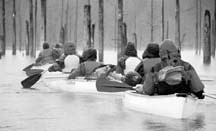 "Jay has taken us in new directions," said Fairbairn. He points to the trades program, the provincial resource program for auditory hearing equipment, the Toba Inlet Initiatives with the development of the camp and training facility, the ecology and sustainability programs and camps, and Coast Mountain Academy (formerly the BOATT Program).
"Jay has taken us in new directions," said Fairbairn. He points to the trades program, the provincial resource program for auditory hearing equipment, the Toba Inlet Initiatives with the development of the camp and training facility, the ecology and sustainability programs and camps, and Coast Mountain Academy (formerly the BOATT Program).
"These are things that Jay has initiated as ideas and these ideas were pursued through his leadership," said Fairbairn.
Powell River also boasts a state-of-the-art theatre that is easily one of the best in province and has an all-weather lighted playing field at Brooks Secondary School.
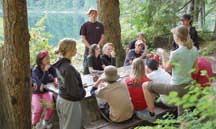 "There aren't many school districts of our size that have what we have," said Fairbairn.
"There aren't many school districts of our size that have what we have," said Fairbairn.
About 70 Powell River students attend the dual credit trades courses annually and can choose from Automotive, Welding, Hairdressing, Culinary Arts and Carpentry.
The School District also offers other dual credit courses that can lead to university credits in Spanish, Digital Film, Psychology, Business Computer Applications, and Introduction to Human Services.
In 2009, Culinary Arts, Welding, and Carpentry were offered in a First Nations setting in partnership with Kiewit, Powell River School District, and The Vancouver Aboriginal Skills and Employment Partnership (VanASEP). Twenty-one students were admitted to the ten-month program, which had a 70% completion rate.
A changing world is reflected in changing course selections. The district's Sustainability and Ecological Education Department provides students with outdoor educational opportunities that reinforce their connection to the natural world and foster sustainability. "We focus on giving students the necessary skills to think critically about personal choices and the relationships between society, economy, culture and the environment," said teacher Ryan Barfoot, adding that these programs have brought the region onto the world stage.
"Last year 50 % of our students came from out of town and from as far away as the Netherlands. Enrolment has increased every year over the past three years and although we have expanded we cannot keep up with demand. Our programs are designed to give young people an opportunity to turn off their computers and cell phones and explore everything from leadership skills to local ecology in a wilderness setting."
Ecological Education Programs include:
¥ The Coast Mountain Academy: A five-month service-learning program focused on leadership, citizenship, outdoor adventure and skills.
¥ Leadership Ecology Adventure Program: This is an eight- day high action summer wilderness immersion with a focus on local ecology and task leadership.
¥ The Sustainability Toolbox: Student delegates are selected by BC communities to attend. Focus is on training participants to be ambassadors and assist their local governments to become more sustainable.
Through leadership initiatives and healthy outdoor activities, students are empowered to make positive change in the world.
Foresight is a wonderful thing, and over the years our educators have demonstrated the principle. Powell River has initiated many dynamic and innovative programs, and the results show up in the achievements of our students, and our schools.

HISTORIC SCHOOLS: Henderson School opened in 1913 and is Powell River's oldest school. This 1922 photo taken by Albert Mitchell Photographs shows students from our early days. Back row: first student, (unknown); Ermis Cecconi; Raymond Dikes. Second row from back: Bell Gebbie; Sergio Zorzi; Sid Southcott; Sid Patrick; John Richardson; Allan Todd; and teacher Mrs Ritchie. Third row from back: first student unknown; Albert Mitchell; Ray Carney, fourth and fifth student unknown; Fanny Bressanutti; Flora Gribble; eighth student unknown; Gladys Milne, tenth student unknown. Front row: Helen Tosso; Vera Smith; Doris Bailey; Lena Piccoli; fifth and sixth student unknown; Theresa Duplin; Zelma Clayton; Elsie Trozolino; Florence Atkinson and eleventh student unknown.

Wildwood school: Students inGrades 3 to 6 in 1927. Names unknown--recognize anyone? (Photos courtesy Powell River Historical Museum)
ESL and phonemic awareness
Teaching language from ear to eye
What do English as a Second Language and phonemic awareness have in common?
Plenty, according to cognition therapist Eva van Loon, who takes students through an individualized program based on phonemic awareness. After years of the program's stunning success fixing learning problems with individuals, van Loon asked, "If this program consistently brings students with reading problems ahead four to thirteen years--permanently--in just 38 hours of therapy, what can it do for people learning English as a second language?"
A new concept, phonemic awareness teaches language from the way it sounds to the way it looks, from ear to eye rather than the opposite approach taken by phonics or phonetics. "We naturally learn our mother tongue by hearing it, imitating it, and then applying the sounds to written codes on the page. Reading and understanding then become second nature--unforgettable as sounds and codes lodge in the subconscious."
Suspecting this approach could improve accent as well as raise comprehension of ESL students, van Loon gained TEFL (Teaching English as a Second Language) certification last December before approaching Rachelle Warman, School Director of the new Westwind English Academy with the idea. Warman, whose school also offers Spanish, Italian, French and German classes, was intrigued.
The two educators put together a pilot with Maria Mejias, a Venezuelan lawyer and teacher who now teaches Spanish at Westwind and oversees Latin American sales and marketing. "There is noticeable improvement in Maria's pronunciation and accent in the short time that Eva has been working with her," remarks Warman.
To Mejias, who is a comparatively recent immigrant to Canada and hopes to lighten her accent, the course is proving a revelation about the aural building blocks of English. "And I'm having a ball learning from Maria how the basic sounds of Spanish affect ESL students," says van Loon, also a lawyer and teacher.
"This is exciting. If our hunches work out, Powell River will have the sharpest cutting-edge language-learning school anywhere. Westwind English Academy can offer a special program--call it "Second-Nature English," to students seeking not only a better accent and automatic comprehension, but also reap side benefits of the program, like improvement in IQ scores, memory and attention."
Family Matters
By Isabelle Southcott
If you're like me, there are times when cooking the evening meal becomes a chore you dread, rather than something you look forward to.
Don't get me wrong; most times I enjoy cooking. I'm not a fantastic cook (like my sister) but I'm not half bad when I put some time and effort into a meal. Still, there are times when I feel like I'm simply feeding my kids when we're in a rush to eat and get to the hockey rink or air cadets. I look forward to meals that I have time to plan. If I get bored cooking the same meals I can just imagine how bored my kids get eating the same meals!
There's nothing like travelling to a foreign country to add spice to your cooking but unfortunately we can't always jump on a plane when we need a shot of inspiration.
Last month, I did a bit of traveling in Powell River and was inspired to try out some new recipes. I took in Cooking with Stella at the Powell River Film Festival and besides sitting next to a delightful couple who'd just bought a home here earlier that day, I came home with the postcard about some of Stella's favourite dishes. I showed the card to Matthew, my 12-year-old foodie and he immediately said: "Mom, let's try this one!"
It was Kerala Shrimp Curry.
I printed the recipe off the internet and read the preamble. "Stella's glorious shrimp curry is well known throughout the diplomatic circles of Delhi. It is one of her signature dishes, tart with tamarind and lush with coconut milk."
Well, if it is good enough for diplomats, it is probably good enough for Matthew and me, I thought as we headed off to shop for the ingredients.
As we chatted about the gourmet meal we planned to cook, the topic of dessert came up. I very rarely make dessert but with Alex away at the Olympics that weekend, we decided to spoil ourselves and make chocolate mousse. I'd seen some hot food chef on TV the week before whipping up this dessert and had written down the recipe.
The mousse was easier than the curry so Matthew made that first with hardly any help from me. He maintains his toughest job was keeping me away from the chocolate but I think that was just so he could lick the bowl!
The whole time we worked together in the kitchen we chatted. Both my kids enjoy cooking and are fairly handy in the kitchen. We talked about travelling, where we'd like to go, what we'd like to see and what kind of food we'd like to try.
When you're working together in the kitchen on a lazy Sunday afternoon, all kinds of things come up. It's a great way to catch up on what's happening in the other person's life.
There's something about preparing and sharing a meal that brings people together. For Matthew and me, it was Kerala Shrimp Curry that brought us together on a Sunday afternoon with Stella, exotic ingredients and images of India.
"Cherish those times with your son," my sister said when I told her about our cooking adventure.
I do and I will because I know that someday, these times will be but a memory.
When games can make a difference
Never too old to compete
By Tricia Andrews
Picture a life that is full--sailing up and down the coast with your husband, volunteering, attending meetings and church, raising a family...then suddenly at 59 you find you are a widow with a mighty big gap in your agenda book. This happened to Nancy Lalonde.
Some aspects of her life remained the same. She was still a member of Women of the Moose, she was still an active member of Assumption Church and sang in the choir, and she still had her children. But she needed something else. Nancy tried aquacises with her daughter at the complex and that helped but then a chance encounter turned her life in a new direction. While asking for information on a class she was asked had she considered swimming in the BC Senior Games. Although Nancy had been swimming all her life she had never thought of competing. Her swimming was pretty basic, just for fun. Competitive meant Olympic-style swimming and that was not for her. She answered "No."

Her soon-to-be new friend would not take "No" for an answer. She encouraged Nancy to come along to a workout and see. People shared what they knew and coaches were found to increase their skill level even higher. Nancy went to that first swim practice and found it was just what she needed. Not only was she improving her swimming, she was meeting new people. They didn't just swim together; they went out for lunch together and supported each other's activities. Birthdays were always a good excuse for cake and a bit of a special lunch. There was also support for each other during times of loss. And the enthusiasm was infectious. Going to the BC Senior Games in New Westminster in 1997 as a novice swimmer was exciting enough but Nancy and New Westminster were also sharing a birthday, they were both 60. Nancy was entered in four events and won four medals! She was hooked.
Being in the BC Senior Games is not just a few days in August or September--it's a year round activity. Goals are set and in order to meet those goals practice is necessary. Nancy swims twice a week for most of the year but starting in June she ups the frequency to three or four times a week. Powell River is part of Zone 2, which also includes Vancouver Island as far south as Ladysmith. Swimmers hop on the ferry and go and practice with the Courtenay/Comox swimmers. Nancy and the other team members wear their team colours (white with hunter green) when they travel. The arm of Nancy's team jacket is covered with crests from all the Games she has attended; she has not missed one since she started.
Travel is a part of the BC Senior Games experience as they are held all over the province. This year they are in Courtenay/Comox/Campbell River so no plane, no bus, just the familiar ferry ride to Little River. Nancy is looking forward to the Games being so close. Although the competitors must stay over in Courtenay for the entire time, it gives friends and relatives more of an opportunity to come and watch. She is also hoping that more people from Powell River will take part in the games.
The mission of the BC Senior Games Society is to improve the health, lifestyle and image of British Columbians 55 years and older. There are close to 30 different events from sports to cards to one act plays. Check out the website at www.bcseniorgames.org or call me at 604 414-0530 for more information. Nancy is glad she joined the Games and she hasn't stopped trying to get new people to join up. She helped get me hooked; what about you?
For Art's Sake
By Jessica Colasanto
March is here, which means it's time for the Grand Concert--the highly anticipated culmination of the Powell River Festival for the Performing Arts. Starting at 7:30pm on March 3, the Grand Concert promises to showcase the best performances of the festival, featuring a wide variety of talented artists of all ages. Our community packs the Evergreen Theatre to hear selections from speech arts, instrumental and band, vocal and choral, strings and piano music. This festival is a tremendous organizational feat; special thanks are due to the sponsoring Rotary Club and all of the folks working behind the scenes to ensure that we can all reap the rewards of its success. We're also fortunate to have such high calibre adjudicators in attendance, encouraging and inspiring each artist to take the stage throughout the event.
Speaking of dedication behind the scenes, a local business owner has made a very sweet contribution to our local arts scene. Carol Waldorf, manager of the Sweet Shoppe in the Town Centre Mall, has donated the use of her display window to the Powell River Fine Arts Association (PRFAA). "It's really fun," she says. "I think it's really awesome that people will get to see just how talented these artists are." Carol feels it's important for the non-profit group to have a place to showcase their work in a high-traffic area; she looks forward to seeing paintings, pottery, quilts and weavings on display. She expects the works will change on a monthly basis; the window is currently filled with paintings by Sari Spencer, president of the PRFAA. For more information about the displays, contact the PRFAA at 604 483-3349.
On March 19th at 8 pm, the Rakish Angles will fill the Unitarian Hall with their blend of string band tradition and contemporary composition, which they describe as "Old-time/Latin/Gypsy-Grass." Hear for yourself why they were nominated for "Instrumental Group of the Year" at the 2009 Canadian Folk Music Awards. Listen to sound clips at www.RakishAngles.com.
The Max Cameron Theatre also has some treats in store. On March 5, the Second Annual Whoop-di-doo Evening of Storytelling for Grown-ups will bring award-winning author Ivan E. Coyote back to town. Local storytellers from both Tla'Amin and the Storyteller's Circle will also take the stage for an evening of spoken word surprises.
March 27th brings us a live broadcast of Ambrois Thomas's Hamlet, direct from the Metropolitan Opera in New York at 10am. This production stars Natalie Dessay and Simon Keenlyside, and features Ophelia performing "an extended mad scene that is among the greatest in opera." Details are at www.MaxCameronTheatre.ca.
Our local arts scene offers a diverse range of talent; turn out to support it!
Powell River Festival of the Performing Arts

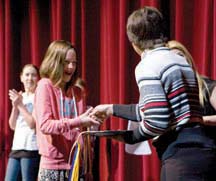


ON STAGE: Whether reciting poems, singing, or playing music, there was a lot of talent on display at the Evergreen Theatre during the festival.
Photos by Robert Colasanto and Sean Percy
Business Connections
By Kim Miller
The Chamber of Commerce will hold its annual general meeting and luncheon on Friday March 26 at the Town Centre Hotel at noon. Guest speakers will be local dignitaries, Mayor Stewart Alsgard, Chief Clint Williams, MP John Weston, MLA Nicolas Simons and Regional District chair Colin Palmer.
A creative fashion designer has set up shop in his home in Powell River. Blaire Hobbs is the designer and owner behind Alexandrae's Apparels. He's been in the fashion industry for 10 years and specializes in plus sizes for women. He'll re-construct an existing piece or create a custom design based on a customer's vision.
Blaire has a fashion diploma from the Blanche MacDonald Centre in Vancouver. He also does alterations and repairs. Call 604 485-7603, or visit www.AlexandraeApparels.webs.com.
Norah LeClare and Dee Little have developed PR Business Centre to offer a variety of services to all businesses, organizations, groups and individuals. Norah and Dee offer everything from basic typing to data basing, to web design and forms and much more. Check out www.PRBusinessCentre.com for more information.
According to a recent study search engines are now the number one media type consumers use to find local businesses. Experts say that when a customer starts searching they are usually ready to buy. Even if you have a website, if it isn't being promoted, it's like putting up a billboard in the desert, which means no customers. For this reason, Robin Murray has opened Shooting Fish In A Barrel Marketing to help local businesses and professionals get more customers by maximizing their exposure on the internet. For more info check out www.ShootingFishInABarrelMarketing.com or call him at 604 483-1474.
Lisa Millar, a hairdresser for 15 years, has opened a hair salon south of town. Urban Roots offers complete family hair care, as well as Canadian-made and organic products, flat irons and locally-made jewellery. Lisa is located beside Skeeter Jacks, at C-9398 Highway 101 South. Contact Lisa at 604 487-4000.
Wilf's Special-T Shop was purchased by Doug Bleaney and relocated to 6664 Drake Street last August. Doug says that although he purchased and moved the business last year that some of his customers don't know they are no longer at the old location.
"Wilf's is no longer at the old location. It is in business and now located at 6664 Drake Street. Our phone number is 604 483-2078." If you need any upholstering or boat covers or furniture restoration work done, call or drop by!
Total Delivery Services is located at 7385 Duncan Street and is open Monday to Friday from 8 am to 1:30 pm. For more information call Nikki at 604 485-0443.
Do you have any changes within your business you want Powell River to know about? New managers, new owners or are you moving locations? Starting a new business? Call the Chamber office at 604 485-4051 and I will get your info into the next issue.
We also like to get email addresses from anyone who is interested in getting monthly Chamber updates and invitations to community events. Send me your email address and I will put you on the list.
Toastmasters changes lives
How Marjorie learned to fly
By Linda Wegner
When Marjorie Harding first came to Toastmasters she was too scared to participate. The first time she spoke, she clutched the lectern, fighting nausea and tears. One year later she's president of the Clam Diggers Association and her family and friends marvel at the changes that have taken place in her life. Marjorie has gained confidence as a public speaker and after several years of wrestling with her fears she found the courage to undergo needed surgery. It's the stuff of books and movies.
"Kill the fear and do it anyway," she told herself as she took one of the bravest steps of her life and joined Sunshine Speakers Toastmasters. That was February 17, 2009. Back then she was too frightened to voice her opinion and too insecure to believe that anyone even cared about what she had to say. Today she's not afraid to boast she soars on proverbial wings.
For sixteen years Marjorie lived on Nelson Island in semi-isolation, the perfect setting, she thought, for her prison of "incredible shyness." Challenged by opportunities to take leadership roles in her children's activities, the need to act as advocate for her ailing father and an opportunity to serve on the local Clam Advisory Board, she realized how debilitating her fears had become.
"I tried a couple of things in an attempt to overcome them," she says. "Ultimately my sister, a member of Toastmasters in Edmonton, recommended that I try it."
She heeded her sister's advice after seeing an ad for Toastmasters. "I talked to Barb [Rees] and she encouraged me to try."
Quaking inside, she took the next step and attended her first meeting.
"I found the people to be very friendly and welcoming. I decided to give it a try and I joined," she continues. "It was the hardest but the best thing I've ever done."
Under Barb's mentorship the transformation process began. Her confidence grew as she learned how to turn hand written notes into speeches (she's given five this year).
"That led to my making eye contact with people but by a mile the most challenging part was being able to think and speak on my feet. That's now the most helpful part for me."
Back then thinking and speaking on one's feet--known in Toastmasters as Table Topics--was the exercise that she feared most. Not anymore!
Being able to take part in Table Topics means she no longer feels like a victim at the mercy of the presenter, she says.
"Now I feel that I own the lectern. If anyone asks a question of me, I can focus on the question and go from there," she says, bubbling with excitement. "I used to think that having my face go red was the worst thing that could happen."
Her hope that by joining Toastmasters she would be spared the embarrassment of a flushed face was realized. Now she's set her sights set even higher.
"I soon discovered that was the least of my problems," she continues. "Now I don't really care. Now I focus on what people are saying to me.
She credits her new-found courage for helping her overcome her fear of flying. In a recent 25-year anniversary celebration, she and her husband flew to Las Vegas: "I was a new country, in a strange city, with lots of people. I even flew in a helicopter!"
For Marjorie and others, the sky is the limit. Toastmasters meets weekly in School District 47's lower boardroom (see community calendar for specific times). There are leadership opportunities and exciting contests such as the March 11 club speech and evaluation contest at 7 pm.
Learn about the new tax
Like it or not, the HST is on its way. The Government of BC plans to combine the Provincial Sales Tax with the Goods and Services Tax to create the Harmonized Sales Tax (HST) on July 1. The BC HST rate will be 12%, composed of a 5% federal and a 7% provincial tax. It will be charged on most goods and services. What will the HST mean for business?
Many business people have questions and concerns about the HST. If you're one of them, plan to attend a presentation on the HST on Wednesday, March 24 at 7 pm at the lower Legion Hall on Alexander Street. Presenters Rod Allan, Certified Management Accountant and Self-Employment Coordinator with Community Futures, and Bookkeeper Lisa Beeching, owner of Lisa's Bookkeeping, will provide an overview of the HST and how it will affect businesses. They will talk about:
¥ Transition Rules
¥ Input Tax Credit ITC) Restrictions
¥ Mandatory electronic filing for certain HST Registrants
¥ Wind-down of PST
¥ Point-of-Sale Rebates and the New Housing Rebate
This event is brought to you by Powell River Women in Business. Admission $5 for non-members; members free. Pre-registration required. Please call Bonnie at 604 485-0003 or email bonnie@prliving.ca.
How the mighty have, and do fall
...and rise again with a little help from their friends
By Elizabeth Horsfield
It is the season for falls with ice on the windshield again. Slippery leaves, mud, bear droppings, long coats or skirts that catch on things and all the other stuff that can trip you up out there, threaten our vertical-ness. Not the least of these threats are dogs. I speak from experience because I walk a rather large dog daily.
My doctor, as I have now joined the ranks of the frail and elderly because of osteoporosis, is forever cautioning about falls. She is a wise woman and it is something to think about these days as the bulk of the Powell River population gets no younger.
What would you do if at dusk you came across a stranger with dogs cavorting all around her prostrate form, not in a prayer to Allah, but in a down there and hurting position by the edge of the road? Would you help her up and try to control the dog play? Well, some passers-by did that for me and I am eternally grateful after having got wrapped up in a 101 Dalmations-like tangle. I landed smack on my knees on the pavement. I am still limping a few days later as I hear other tales of pain and woe from falls in winter: A hand caught in the garage door all black and blue; a woman who caught her skirt on the edge of the French fry stand on Marine Avenue and went for a spill, taking the stand with her luckily missing the slop of hot oil; and someone who fell off the slick narrow boat path into the water on the old pier; and so on. And then, there are the bear stories which can cause you to falter a bit too.
Be careful! And be grateful for and to people who help. Dogs licking your face as they try to pull the ball out of your pocket when you are lying on the cold ground is not the same as some kind human being hoisting you up and telling you to go and put ice on your knee and then offering you a lift home. Such is the neighbourhood I have here in Cranberry. Good Samaritans still exist.
Anyway, I think there are other stories and offer this one to you as a cautionary tales about falls. The long cold winter is upon us and we do not want or need more people in the hospital now the flu season is here. Them knee bones sure can smart, not to mention hips, shoulders and backs.
I now have a walking stick, a squirting water bottle full of stinky fluid to blast unleashed dogs with and I am polishing up my doggy-be-gone vocabulary. It works on bears if commanding enough, so why not dogs? There is something about those little balls of playful snarling white fluff which hurl themselves at big dogs that makes me nervous. Alf, my usually good natured dog, and I are wiser and more wary now.
If you are ever around Cranberry and see an old grey-haired girl out walking with a lot of defensive equipment you will know it is me. I am practicing my aim and the air might get a little blue this time, not my knees again. Thanks again to people who stop to help someone up. I am not blaming the dogs as I know it is the nature of a dog to be exuberant and want to meet and greet other dogs in dog ways. Just try not to get in the midst of them.
As another neighbour noted rather sardonically, "Dogs have four legs, you only have two."
Seedy Saturday grows up
Workshops, seed swap and gardening tips
By Wendy Devlin
The annual event that gardeners, growers and wanna-be green thumbs have been waiting for is just around the corner with Seedy Saturday taking place from 10 am to 3 pm on Saturday, March 13 at the Powell River Recreation Complex. This year's seed exchange and garden fair features twice as many workshops, community group information, demonstration tables and fun activities.
Everyone is encouraged to bring seeds to the seed exchange. If you are new to seed saving or gardening, and don't yet have seeds to swap, donated seeds are available for fifty cents a package, up to 10 packages. There's also a swap area for books and magazines about gardening or practical skills.
Seedy Saturday is a community-networking event, designed to bring together people interested in promoting regional sustainability and economic resilience. The supply of reliable, high-quality sources of seeds should not be taken for granted. Heritage, open-pollinated vegetable varieties are discontinued from many seed catalogues, becoming increasingly difficult to obtain. The amount of seeds in a package gets smaller while the price continues to rise over the years.
Much of the flower and vegetable seed sold in Canada is grown elsewhere in the world.
International political and economic troubles can disrupt global supply and distribution of food and seed. A few mega-corporations like Monsanto (of bio-engineering fame) now control the supply of the world's seed supply, especially for significant food crops, like corn, soya beans, wheat, rice etc. Plus, the age-old problems of drought and disease can wreak havoc with our food supply.
There will be a table where everyone can learn how to sow seeds and make a newspaper pot. At another table, you will learn how to make a seed ball.
You'll have the opportunity to talk with a worm composter, beekeeper, master gardener and other experienced presenters.
There's also something for the little ones. Family Place will have a special corner with loads of fun activities just for the kids so make sure you bring the whole family out to this event.
To build our food-producing community, four garden-related workshops are being held in the Spruce Room. Four more workshops featuring sustainability projects will run in the Poplar Room.
Workshop Schedule ¥ March 13
Spruce Room
10:30 am ¥ Plan for your best garden yet!
Jenna Adema and Jonathan van Wiltenburg lead you through the basics of planning a garden, which takes into account your space, your climate, your soil conditions, and what you want to grow and enjoy from your garden.
11:30 am ¥ Getting seeds off to a good start
Rosie Fleur shows you how to get your plants started under good growing conditions, how to adjust light and temperature for the best results, and how to time your starts so that they can go from flats to garden and grow into hardy productive plants.
12:30 pm ¥ Growing berries in Powell River
Doug Cooper is your guide to the basics of choosing berry varieties, extending the productive berry season, preparing the soil, fertilizing and watering, pruning and transplanting. Come and find out how to have more delicious berries.
1:30 pm ¥ Seed-saving 101
Wendy Devlin explains the techniques of basic seed saving for your favourite plants and how to create a seed-saving Mecca of vegetables, flowers and herbs in your garden.
Poplar Room
10:30 am ¥ Food Security: The 3rd Annual Report
David Parkinson, director of the Powell River Food Security Project presents a survey of the community initiatives around the region, which promote increased local food production and healthier eating choices for everyone.
11:30 am ¥ Transition Initiatives:Rebuilding Community Resilience
Kevin Wilson, president of Transition Town Powell River (TTPR), will facilitate a workshop, designed to rebuild community resilience in response to climate change, resource depletion and economic instability.
12:30 pm ¥ Time to SALSA
(Society for the Achievement of Local Sustainable Agriculture). Certified organic market farmer, Helena Bird, from Hatch-a-Bird Farm, Wildwood introduces SALSA, a community-inspired sustainability initiative.
1:30 pm ¥ Powell River's Seed-Saving Project
Keeping the high country open
Campaign to keep Goat 2 road active
Backcountry users are rallying to protect an important access road into the high country.
The Goat 2 road, which now takes explorers within a day-hike of Triple Peaks and the South Powell Divide, is scheduled for deactivation, which would close the road to vehicle traffic.
Conditions of the provincial government permit require Plutonic to deactivate it, but Plutonic is holding off doing the deactivation while recreation users and the Powell River Regional District work to see if the regional government could take over the Goat 2 road permit, with, possibly, user groups doing maintenance, with financial help from the money Plutonic would have spent to deactivate.
Eagle Walz, who is helping coordinate the campaign, called the road a "fabulous recreation and tourism resource."
"We must do all we can to ensure continued ACCESS to Triple Peaks and the South Powell Divide."
"This Access is not only for us, and for creating more jobs, but it is for our children and grandchildren so that they too will have an opportunity in the future to get to the beautiful wild spaces that surround us."
 Late last month, Walz, with other members of the Outdoor Recreation User Groups, took Regional District chair Colin Palmer and City councillor Maggie Hathaway up Goat 2 to have a good look at the condition of the road and its adjacent surroundings.
Late last month, Walz, with other members of the Outdoor Recreation User Groups, took Regional District chair Colin Palmer and City councillor Maggie Hathaway up Goat 2 to have a good look at the condition of the road and its adjacent surroundings.
"We stopped at a half dozen places along the way and looked at everything thoroughly with critical eyes. We looked at the bridges which were donated to us by Plutonic, and found them in excellent condition and in good locations."
"We came away with a new appreciation for the road and the awesome valley through which it runs," said Walz.
 "Goat 2 provides access to some of the most scenic and easily accessible alpine available in our area," said local hiker Andy Evans. "Triple Peaks, The South Powell Divide, Schwim and Marmot are also accessible from Goat 2."
"Goat 2 provides access to some of the most scenic and easily accessible alpine available in our area," said local hiker Andy Evans. "Triple Peaks, The South Powell Divide, Schwim and Marmot are also accessible from Goat 2."
Removing the access would make the Triple Peaks hike an overnight trip and some people just can't do such an adventure.
"If the Regional District decides to take on the Liability for Goat 2, I personally will be active in doing hand maintenance to keep the road 4 x 4 accessible. Many user groups have expressed interest in doing the same," said Evans.
"This isn't just about a road, It is about keeping Powell River's backcountry accessible to everyone. This is why so many people choose to live here. There are also many Tourist opportunities to promote with keeping the backcountry open.
A Facebook page created to show support for keeping the road open has more than 225 members.

photos by Jennifer Jacques
www.jenniferjacquesphotography.com
